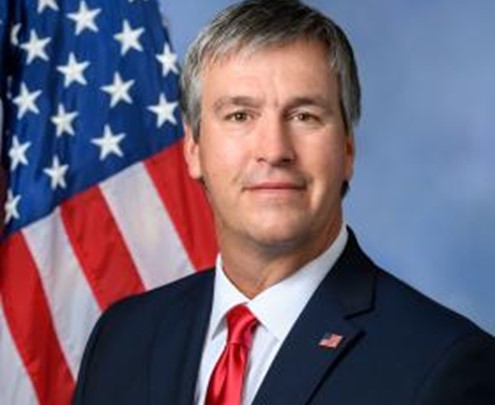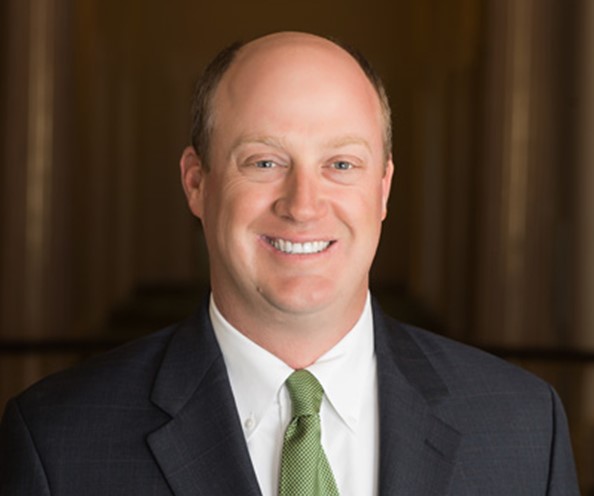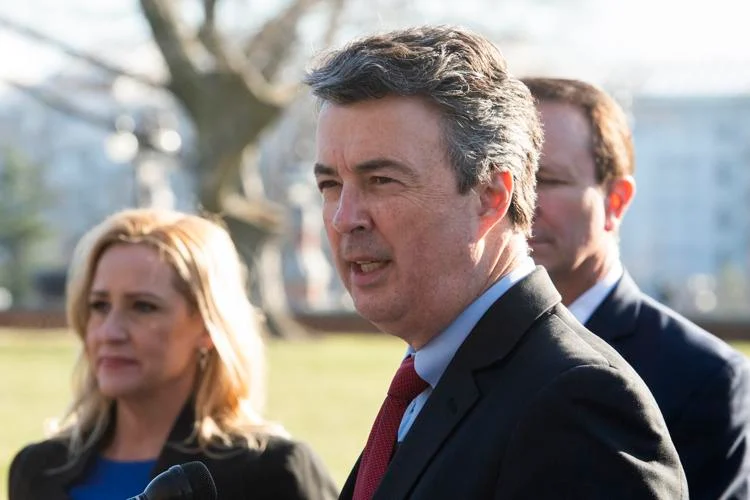Senator Tommy Tuberville believes indictments have made his support for Donald Trump ‘even stronger’

U.S. Senator Tommy Tuberville said in a recent interview that his support for President Donald Trump has gotten “even stronger” due to Trump’s recent indictments. Tuberville said that indicting the former President was like something that happens in third-world countries. Tuberville made the comments in response to questioning from Fox Business Channel’s Larry Kudlow, who asked if Sen. Tuberville’s support for Trump had moved at all in light of the indictments. “It makes it even stronger, Larry,” said Sen. Tuberville. “Are we living in a third world country now where the political opponents – basically the one in the White House now (Joe Biden) is going after somebody that he is going to run against in the next election?” Tuberville also referenced Biden’s own mishandling of classified documents as a U.S. Senator. “If you live in a glass house, you don’t throw rocks, and he has opened a can of worms now – the Justice Department has,” Tuberville added. “That’s really ignited the Republican Party, and I think even some of the Democrats. What kind of a world do we live in now?” “Every time I go in to read a classified document, they search you when you leave,” said Tuberville. “You are not allowed to carry classified documents out of what we call the skiff.” “It is just unfortunate that all of this is going on,” Tuberville added. “President Trump will be stronger from this. He can handle it. He knows adversity. He fights through it, but the American people need to see through all of this. Hopefully, this will clear up in a very short period of time, and we can get this behind us.” The bulk of the 37 charges against former President Trump in the 49-page indictment, unsealed last month, relate to allegations of willful retention of national defense information — a violation of the Espionage Act. The charges also include conspiracy to obstruct justice, withholding a document or record, corruptly concealing a document or record, concealing a document in an investigation, scheming to conceal, and false statements. Trump aide Walt Nauta also was indicted. Trump maintains his innocence. Despite his growing legal difficulties, the former President is the frontrunner to be the 2024 Republican nominee for President. Trump will speak in Alabama on August 4 as the featured Speaker at the Alabama Republican Party’s Summer Dinner in Montgomery. Tuberville was the first U.S. Senator to endorse President Trump ahead of the 2024 Republican primary. Tuberville was endorsed for U.S. Senate by Trump in the 2020 Republican primary, and Tuberville has remained steadfast in his support for President Trump. The Alabama Presidential primary will be on March 5. To connect with the author of this story or to comment, email brandonmreporter@gmail.com.
Barry Moore counters President Joe Biden’s economics claims

On Monday, Congressman Barry Moore wrote a column expressing his concerns that President Joe Biden’s economic policies are hurting middle-class American families. “Last week, President Biden gave a speech in Chicago touting the success of his “Bidenomics” plan,” Rep. Moore wrote. “He says his policies are helping the middle class – but statistics show that couldn’t be further from the truth. Biden’s new, woke government regulations have cost the average American household an extra $10,000 over the last two years. What could you have done with that money in your bank account?” “Thanks to “Bidenomics,” Americans have experienced doubled gas prices, more than $32 trillion in national debt, and the highest inflation in 40 years,” Moore continued. “Because inflation has exceeded wage growth, hourly compensation has fallen by 5 percent since Biden took office. His average inflation rate since taking office is 16.3 percent – only President Carter had a worse rate. No wonder 64 percent of Americans say they disapprove of his economic policies.” The voters’ perception of President Biden’s economic policies will likely be a major focus of the 2024 presidential elections. Moore continued, “Americans can’t afford another term of “Bidenomics.” The cornerstone of Biden’s economic plan was his student debt handout. I spoke out against this unconstitutional giveaway, and I’m grateful the Supreme Court struck it down. This was a massive victory for American taxpayers, who would have been forced to foot the bill of $400 billion over the next 30 years – even if they chose not to go to college or had no loan debt.” “Another key part of “Bidenomics” is the president’s new socialist rule that forces Americans with good credit ratings to pay higher fees to cover those with poor credit ratings,” Moore continued. “Biden calls this rule “equitable access to home ownership,” but I’m old fashioned – I just call it stealing. House Republicans recently passed H.R. 3564, the Middle-Class Borrower Protection Act, which would end this ridiculous rule that could cause mortgage fee increases of up to $3200 per year for those with good credit ratings.” President Biden defends his economics policy, which he says is responsible for record-strong job growth. “This is Bidenomics in action: Our economy added more than 200,000 jobs last month—for a total of 13.2 million jobs since I took office,” President Biden said on Friday. “That’s more jobs added in two and a half years than any president has ever created in a four-year term. The unemployment rate has now remained below 4 percent for 17 months in a row—the longest stretch since the 1960s. The share of working-age Americans who have jobs is at the highest level in over 20 years. Inflation has come down by more than half. We are seeing stable and steady growth. That’s Bidenomics—growing the economy by creating jobs, lowering costs for hardworking families, and making smart investments in America.” Barry Moore is serving in his second term representing Alabama’s Second Congressional District. Both Moore and Biden are up for reelection next year. To connect with the author of this story or to comment, email brandonmreporter@gmail.com.
Republican’s hold on nominations leaves Marines without confirmed leader for 1st time in 100 years

The U.S. Marine Corps is without a confirmed leader for the first time in a century as Gen. David Berger stepped down as commandant on Monday, and a Republican senator is blocking approval of his successor. Berger took over as the 38th commandant in July 2019 and is required to leave the job after four years. Gen. Eric Smith, currently the assistant commandant, has been nominated to be the next leader but will serve in an acting capacity because he hasn’t been confirmed by the Senate. Under the law, Smith can serve as the acting commandant, but he can do nothing that would presume confirmation. As a result, he can’t move into the main residence or the commandant’s office, or issue any new formal commandant’s planning guidance, which is traditional for a new leader. He has the authority to implement new policies such as budget, training, and other personnel decisions. Smith’s promotion delay is the first of what could be many top-level military officers held up by Sen. Tommy Tuberville, R-Ala. Tuberville has stalled all nominations for senior military jobs because he disagrees with Defense Secretary Lloyd Austin’s decision to have the Defense Department pay for travel when a service member has to go out of state to get an abortion or other reproductive care. Abortion is now illegal in Alabama. Speaking at a ceremony at the Marine Barracks Washington, just down the street from Capitol Hill, Austin and Berger called on the Senate to take action. “We need the Senate to do their job so that we can have a sitting commandant that’s appointed and confirmed. We need that house to be occupied,” said Berger, with a nod to the commandant’s quarters at the edge of the parade field. Austin and other Pentagon officials have pressed the Senate to move forward, saying that delays are already impacting more than 200 military officers and many key leaders. “You know, it’s been more than a century since the U.S. Marine Corps has operated without a Senate-confirmed commandant,” Austin said during the ceremony. Because of Berger’s requirement to step down in July, the Marine job is the first of the military chiefs to be affected by Tuberville. The Army, Navy, and Air Force are all expected to face the same delay later this year, as could the nomination of the next chairman of the Joint Chiefs of Staff. The current chairman, Army Gen. Mark Milley, leaves his job at the end of September. Gen. CQ Brown, the current chief of the Air Force, has been nominated to replace Milley and is scheduled to go before the Senate Armed Services Committee for his hearing on Tuesday. The hold, however, is also impacting scores of one, two, and three-star officers who are assigned to new commands but can’t move on. It also affects their families, who usually relocate over the summer to their new military communities so school-age children can settle in before fall. “Smooth and timely transitions of confirmed leadership are central to the defense of the United States and to the full strength of the most powerful fighting force in history,” said Austin. “Stable and orderly leadership transitions are also vital to maintaining our unmatched network of allies and partners. And they’re crucial for our military readiness.” Smith hit the thorny issue head-on during his remarks at the ceremony Monday — saying he wanted to get one thing out fast. “If you’re saying, ‘What am I supposed to call you?’ ACMC. That is my title, and one that I’m proud of,” said Smith, using the shorthand for his assistant commandant role. But he quickly added, “To make sure that there is no confusion — all orders, directives, and guidance, which were in effect this morning remain in effect unless I direct otherwise. Further guidance to the force will follow.” Sabrina Singh, a Pentagon spokeswoman, said Monday that as of last Friday, there were 265 senior officers whose promotions have been held up by Tuberville, and that number could leap to 650 by the end of the year if the issue isn’t corrected. She noted that in more than 100 cases, officers — like Smith — would be forced to do two jobs at the same time because no one can move up. She said the Pentagon is asking officers to delay planned retirements and stay on, while in other cases, officers are doing more senior-ranking jobs without getting the pay for that new rank. The last time the Corps was led by an acting commandant was in 1910. Then-Maj. Gen. George Elliott, who was the commandant, reached the required retirement age in November 1910 and left the office. Col. William Biddle served as the acting commandant until he was promoted to major general and became commandant in February 1911. Berger, a native of Woodbine, Maryland, graduated from Tulane University and was commissioned in 1981. He commanded at every level, including tours in Iraq and Afghanistan. During his tenure, he spearheaded a broad campaign to transform the Marine Corps to better be able to fight amphibious wars in the Pacific after years of battling terrorist groups in the Middle East. The plan was lauded by many in the Pentagon and Congress as a critical way for the Marines to prepare for a potential conflict with China. Smith, a career infantry officer, is a highly decorated Marine who served multiple tours in Afghanistan and Iraq, including time in Fallujah and Ramadi during heavy combat in 2004 and 2005 in Operation Iraqi Freedom. He later was the senior military adviser to Defense Secretary Ash Carter and, in 2019, took over as the deputy commandant for combat development. Republished with the permission of The Associated Press.
Katie Britt, Rick Scott and colleagues urge Biden Administration to address passport delays

On Monday, U.S. Senator Katie Britt (R-Alabama) announced that she has joined Senator Rick Scott (R-Florida) and 12 of their colleagues in a letter to Secretary of State Antony Blinken urging him to take immediate action to resolve the backlog of passport applications. “Given the sheer number of Alabamians who have recently requested help with a passport issue, I’m concerned that action has not been taken sooner to address this concern, which clearly affects a great number of Alabamians,” said Sen. Britt. “As record levels of Americans continue to book flights across the globe, we request this matter be dealt with immediately and transparently to prevent further backlog.” More Americans are seeking passports, and there are growing delays in obtaining or renewing a passport. According to a recent report, it can take 17 weeks to get a passport renewed. This turnaround time has grown several weeks just since February. In the letter, the Senators note countless reports from Americans in their respective states regarding issues and concerns with delayed wait times, lack of available in-person appointments, and an inability to communicate with passport agencies. The Senators charge that this is an unacceptable failure from a federal government that should be focused on serving American taxpayers and their needs. Joining Senators Britt and Scott were U.S. Senators Bill Cassidy (R-Louisiana), Ted Cruz (R-Texas), Mike Crapo (R-Idaho), John Barrasso (R-Wyoming), Cynthia Lummis (R-Wyoming), Ted Budd (R-North Carolina), Marco Rubio (R-Florida), JD Vance (R-Ohio), Mitt Romney (R-Utah), Joni Ernst (R-Iowa), and Deb Fischer (R-Nebraska). “As summer begins and families across the nation are finalizing their travel plans, we have heard countless reports from constituents in our states about the massive backlogs in processing passport applications,” the Senators wrote to Sec. Blinken. “While we appreciate the hard work of Passport Agency employees across the nation, this backlog and the unresponsiveness to many passport inquiries is unacceptable.” “Since January 2023, our offices have observed a massive increase in passport-related inquiries from our constituents,” the Senators continued. “We understand that the Department of State is experiencing an unprecedented number of passport applications and renewals, but the strategies put in place to address this unprecedented demand appear to need additional attention.” “These backlogs have resulted in many American families being forced to cancel their travel plans because of increased wait times, a lack of available in-person appointments, and an inability to communicate with passport agencies,” wrote the Sens. “Furthermore, the delay many Americans are experiencing in receiving their passport could potentially be detrimental to their livelihood. The Department of State must address these issues promptly to remedy the situation. As our offices continue to work each and every day to assist constituents with their passport needs.” Many countries require a passport to be valid six months after your trip ends. These include India, Kenya, Morocco, Peru, Singapore, Thailand, Turks and Caicos, and Zimbabwe. All 27 European Union member countries require passports to be valid for at least three months beyond the date of departure. Some countries are more visitor-friendly and only require your passport to be valid. These include Argentina, Australia, Dominican Republic, Japan, and the United Kingdom. For travel to Hong Kong, the requirement is one month beyond the trip. Since renewing a passport can take four months, plan accordingly if you have plans to travel or work in a field where foreign travel may be required at some point. Katie Britt was elected to the Senate in 2022 after a career as a lobbyist, attorney, and Sen. Richard Shelby’s chief of staff. To connect with the author of this story or to comment, email brandonmreporter@gmail.com.
New museum in Alabama tells history of last known slave ship to U.S. and its survivors

A museum that tells the history of the Clotilda — the last ship known to transport Africans to the American South for enslavement — opened Saturday, exactly 163 years after the vessel arrived in Alabama’s Mobile Bay. Ceremonies dedicating the $1.3 million Africatown Heritage House and “Clotilda: The Exhibition” took place Friday and Saturday in Mobile. The exhibit tells about the ship, its survivors, and how they founded Africatown community in Mobile after they were freed from five years of slavery following the Civil War. The Clotilda departed Alabama in 1860, more than 50 years after Congress outlawed the importation of additional enslaved people, on a clandestine trip funded by Timothy Meaher, whose descendants still own millions of dollars worth of land around Mobile. The Clotilda illegally transported 110 captive people from what is now the west African nation of Benin to Alabama. The captain, William Foster, transferred women, men, and children off the Clotilda once it arrived in Mobile and set fire to the ship to hide evidence of the journey. Most of Clotilda didn’t burn, and much of the ship is still in the Mobile River, which empties into Mobile Bay. Remnants of the Clotilda were discovered in 2019, and Meaher’s descendants released a statement last year calling his actions 160 years ago “evil and unforgivable.” The museum includes a brief history of the transatlantic slave trade and highlights the survivors of the 45-day journey from Africa, AL.com reported. It tells the story of its most famous passenger, Oluale Kossola, better known as Cudjoe Lewis. His interviews in the 1920s provided information about the Clotilda and its passengers to historians and scholars. Other ship survivors are highlighted, including Matlida McCrear, who died in 1940 in Selma, Alabama, and was the Clotilda’s last known survivor. McCrear was separated from her mother at a young age and tried to escape from a slaveholder when she was 3 years old. McCrear and her sister “fled into a swamp, hiding there for hours until dogs sniffed them out,” according to a display in the museum. “I think those who visit will really learn a lot about this particular story,” said Jeremy Ellis, president of the Clotilda Descendants Association and a sixth-generation descendant of Pollee and Rose Allen, who were enslaved and on the Clotilda. “It tells the story of West African culture, what the 110 experienced at the Middle Passage and the first five years of slavery and what they overcame in 1865 in the founding of Africatown.” Republished with the permission of The Associated Press.
Will Ainsworth: Alabama’s historic grocery tax cut shows me we must always attempt to accomplish what others say can’t be done

Alabamians may have felt their wallets bulge a bit last month when the Legislature approved our bill that slices the sales tax on groceries in half and implements the single largest tax cut in state history. Alabama was one of only three states that taxed groceries at the full rate – South Dakota and Mississippi are the others – and we were one of only 13 states in the nation that levied any tax on food. But beginning on September 1, 2023, Alabama’s 4% state sales tax on groceries will be cut to 3%, and another percent will be automatically deducted when revenues in the Education Trust Fund reach a trigger point that is set in the bill, which is expected to occur as soon as the next fiscal year. Safety provisions have been put in place to ensure that education dollars are protected as the $300 million tax cut goes into effect, and we remain dedicated to fully funding our K-12 public schools, community colleges, and public universities at all times. The bill uses the same definition of groceries as the federal food stamp program, known in D.C. nomenclature as SNAP, which means all groceries will be covered except for pre-prepared, hot food from grocery store delis. A close in the legislation blocks cities and counties from raising their sales taxes on groceries so Alabamians can be assured of the intended savings, but it does allow officials in city halls and county complexes to follow the Legislature’s lead and cut the local food tax, if they choose. For several decades, elected officials and advocacy groups across Alabama have attempted to reduce or remove the grocery tax, but their plans always required other taxes to be raised in order to offset the revenue losses. Many of those suggested tax increases targeted middle-class families, which always doomed the efforts from the start, especially among hardcore Republicans like me. As lieutenant governor, though, I noticed that the conservative budgeting practices implemented since Republicans gained control of the Legislature in 2010 have provided Alabama’s coffers with a sizable financial cushion that did not exist before. Our state’s business sector – ranging from the largest employers to the smallest, mom-and-pop operations – remains healthy, and our continuing success in attracting both new and expanding industries is resulting in unprecedented revenues flowing to the treasury. Putting pencil to paper and running the numbers soon revealed to me that Alabama could afford to cut the grocery tax without needing to penalize any groups or individuals by raising their existing levies. I met with countless experts, advisors, and associations, including the grocers who collect the tax at the point of sale, to rally them to take immediate action and worked with Sen. Andrew Jones (R – Centre), House Education Budget Chair Danny Garrett (R – Trussville), and Senate Education Budget Chair Arthur Orr (R – Decatur) to create a workable plan. Once lawmakers were briefed on our proposal, support for it spread like wildfire. All 35 members of the Alabama Senate agreed to serve as sponsors, along with 100 of the 105 members of the House. I am told by many longtime State House observers that no major bill of such significance has ever achieved the same unanimous and bipartisan support. Our dinner table tax cut will save the average Alabama family the cost of two weeks of groceries, and that financial relief is much needed in the current economic environment because the liberal fiscal policies being pushed and promoted by Joe Biden and congressional Democrats have caused inflation to skyrocket. Between 2022 and 2023, the cost of food rose by an average of 7.7%, according to the U.S. Bureau of Labor Statistics. Eggs alone cost a third more than they did last year, bread and cereal are up by 25%, and meat, fish, and chicken are substantially higher. Our success in cutting the grocery tax demonstrates what can be accomplished if we stay true to our conservative beliefs, build consensus among lawmakers, and have the courage to attempt to accomplish what many say can’t be done. But the job is only half-complete, and work still lies ahead as I am determined and fully committed to abolishing the grocery tax altogether. I ask all of you to join me in thanking each member of the legislature for supporting this historic tax cut. It was a true bipartisan effort. Together, we will continue making an already great state even better. Will Ainsworth has served as lieutenant governor of Alabama since 2019.
AG Steve Marshall opposes Biden administration plan to phase out gas-powered vehicles

Alabama Attorney General Steve Marshall on Thursday released a statement denouncing the Biden Administration’s plan mandating the phasing out of gas-powered vehicles. This move, Marshall argues, would compel the restructuring of the entire automobile industry around the production of electric vehicles (EVs). The proposal by the Biden Administration and the Environmental Protection Agency would boost certain EV sales from 8.4% of total vehicle sales to 67% by 2032. Attorney General Marshall signed onto the 25-state coalition letter opposing the EPA plan, arguing the move would damage our economy, undermine the reliability of our electrical grids, threaten our national security, and drastically increase costs for families and businesses. “Yet again, President [Joe]Biden has prioritized his radical and illogical environmental agenda over the economic realities facing working-class Americans, and this time he’s targeting affordable gas-powered vehicles,” said Attorney General Marshall. “Consumers are already experiencing record high energy prices and painful inflation, and this proposal will only prolong and exacerbate the inflationary pressures that are plaguing our economy. I will always stand guard against Biden’s radical agenda, and I will never stop fighting for consumers and businesses in our state.” “President Biden wants to use the power of government to force a massive shift in demand for automobiles, with the government putting its thumb on the scale in favor of EVs. But Americans don’t want what he is selling,” said Kentucky Attorney General Daniel Cameron. “This is the latest head-in-the-sand approach to achieving the left’s impossible green-energy fantasies. Government shouldn’t pick winners and losers, and an EPA rule that would kill gas-powered vehicles does just that.” The coalition’s letter argues that the aggressive shift to EVs is counterproductive, misguided, and unrealistic. The nation’s power grids not only lack the capacity to accommodate the demands of the new proposed rule, but the grid is also lacking the stability to compensate for these new stringent demands. The EPA’s plan undercuts American energy independence. Additionally, this fast-and-furious approach to electrification will have devastating consequences for our automotive supply chain by making us overly dependent on foreign adversaries, like China, for the raw minerals required for electric vehicle production. According to the Republicans Attorney Generals, at the end of 2022, the average electric vehicle sold for $61,448. Consequently, the coalition argues that it is not the right time to complicate the automobile manufacturing process, which will increase the average price per vehicle. Consumers are already experiencing record inflation, historic gasoline prices, and high utility bills. Attorney General Marshall signed on to the letter with attorneys general in Alaska, Arkansas, Florida, Idaho, Indiana, Iowa, Kansas, Kentucky, Louisiana, Mississippi, Missouri, Montana, Nebraska, North Dakota, Ohio, Oklahoma, South Carolina, South Dakota, Tennessee, Texas, Utah, Virginia, West Virginia, and Wyoming. President Biden meanwhile defended his climate policies. “We passed the infrastructure law with 500,000 EV chargers,” said Biden. “And they’re going to — 500,000. They can — and guess what? It’s going to create a — we’re capping 100,000 wells in the United Sta- — 100,000. Remember all the heat about what was going on in West Virginia and — and south — west — Western Pennsylvania? Well, these same guys who dug those wells — guess what? — they’re getting paid to cap them. And it’s working. And we’re rebuilding. And we’re putting a new environmental plant where that old steel plant used to be in — in Wharton, West Virginia. Fuel economy rules. We cut emissions in half by 30 — by 2032.” To connect with the author of this story or to comment, email brandonmreporter@gmail.com.
Gov. Kay Ivey announces Special Election dates for House District 16

On Friday, Alabama Governor Kay Ivey signed a proclamation to set special election dates for Alabama House District 16. This seat was previously held by State Representative Kyle South (R-Fayette), who resigned to accept a position as the President and CEO of the Chamber of Commerce of West Alabama. “Rep. South has served the people of House District 16 well for the past nine years and will continue to do so in his new role as president and CEO of the Chamber of Commerce of West Alabama,” said Gov. Ivey. “He certainly leaves big shoes to fill in the Legislature, but I am incredibly happy for him and confident he will continue serving West Alabama well. I encourage everyone in this district to get out and vote during this special election to ensure you have another strong voice advocating for you in the Alabama Legislature.” The special primary election will be Tuesday, September 26, 2023. The special primary runoff, if necessary, will be held on Tuesday, October 24, 2023. House District 16 is considered a majority Republican district, so the winner of the Republican primary will likely be elected. The special general election is set for Tuesday, January 9, 2024. The deadline for qualifying with the two major political parties is Tuesday, July 25, 2023, at 5:00 p.m. The deadline for all independent candidates and/or minor parties to turn in their qualifying paperwork, including ballot access petitions to the Secretary of State’s office is Tuesday, September 26, 2023, at 5:00 p.m. The special election for House District 16 will be held in concurrence with the special election for House District 55 in Jefferson County. HD55 became vacant when State Rep. Fred Plump (D-Birmingham) resigned after agreeing to plead guilty to Federal corruption charges. House District 16 includes portions of Fayette, Jefferson, and Tuscaloosa counties. The Legislature will meet next on July 17 to consider court-ordered congressional redistricting changes. Neither HD16 nor HD55 will have representation in place by then. Both seats will be filled, however, by the start of the 2024 Alabama Regular Legislative Session. To connect with the author of this story or to comment, email brandonmreporter@gmail.com.
Sen. Tommy Tuberville asks for DOJ, SEC investigation into crypto firm with ties to China

U.S. Senator Tommy Tuberville (R-Alabama) is asking for an investigation of a Chinese-linked crypto-currency exchange company firm Prometheum, Inc. Senator Tuberville recently discussed Prometheum’s alleged China ties on Fox Business Channel’s Larry Kudlow. “Crypto is here to stay,” Tuberville told Kudlow. “We have got to have regulations, but the thing that we are running into now is we have got what we call crypto exchanges that are coming around all over the country. They have to be approved by the SEC and FINRA, the two regulators.” Tuberville continued, “We all know that they (China) are our number one adversary – the Republicans, the Democrats, people across the country, but somebody needs to tell our financial regulators because what has happened recently. There is a company, Promethium, that has been given the rights to a crypto exchange. Their biggest investor is Wanxiang which is a Communist China Party company. It is their biggest investor. What’s going on with our regulators? There was several dozen companies and people who applied for this, but they went with the Chinese Communist Party company.” Tuberville and five congressional colleagues sent a letter to U.S. Attorney General Merrick Garland and Securities and Exchange Commission (SEC) Chair Gary Gensler requesting a review of inconsistencies in congressional testimony given by digital asset firm Prometheum, Inc.’s Co-CEO Aaron Kaplan and the company’s SEC filings. Senator Tuberville announced the letter in an op-ed published by 1819 News. “Lying to Congress is a crime. Providing misleading information to investors in SEC filings constitutes securities fraud,” said Sen. Tuberville. “…If Prometheum ended its tech buildout with its China-based partners in December 2019 as Mr. Kaplan led Congress to believe, that development should have been reflected in the company’s SEC filings. Instead, Prometheum continued to tout its China-tainted tech partnership to regulators and potential investors for nearly two more years.” Prometheum’s largest outside investor is a China-based company – Shanghai Wanxiang Blockchain, Inc. (Wanxiang) and its subsidiary HashKey Digital Asset Group, Ltd. (HashKey)- with deep ties to the Chinese Communist Party (CCP) that were documented in a Wall Street Journal op-ed written by Senator Tuberville last month. HashKey holds a seat on Prometheum’s board, and until October 2021, Prometheum benefitted from a formal technology development agreement with its Chinese partners. In written testimony submitted to Congress for a June 13 House Financial Services Committee hearing on the future of digital assets, Mr. Kaplan indicated Prometheum began developing its technology platform without influence from Wanxiang or HashKey in December 2019. Tuberville claims that SEC filings submitted by Prometheum throughout 2020 and for most of 2021 indicate the technology development partnership was still in force until October 2021. The letter sent to the Attorney General and the SEC Chair by Sen. Tuberville and his congressional colleagues requests a review of these inconsistencies. Last month, Senator Tuberville sent an oversight letter to the SEC and the Financial Industry Regulatory Authority (FINRA), objecting to those agencies’ approval of Prometheum Ember Capital, LLC – a subsidiary of Prometheum, Inc. – as a special purpose broker-dealer to custody digital asset securities. Tuberville has requested an investigation. Tuberville said that he and Senator Kirsten Gillibrand introduced legislation last week that will keep companies partly owned by the Chinese Communist Party from being able to invest in financial exchanges. “That will keep out Chinese Communist Party investors out of crypto, out of our exchanges, but these regulators are asleep at the wheel,” Tuberville said. “It is just another thing that the Biden Administration has let the Chinese do and get by with, and we need to put a stop to it.” Tuberville was elected to the Senate in 2020. To connect with the author of this story or to comment, email brandonmreporter@gmail.com.
Daniel Sutter: COVID Lab leak misinformation

The U.S. House Select Subcommittee on the Coronavirus Pandemic will hold a hearing on July 11 on “Investigating the Proximal Origin of a Cover Up.” The recent Federal District Court injunction against government censorship of social media increases this hearing’s significance. The hearing will not decide if a leak from the Wuhan Institute of Virology (WIV) started the SARS-CoV-2 pandemic. The hearing will examine the backstory of the March 2020 Nature Medicine paper, “The Proximal Origin of SARS-CoV-2.” In this paper, five leading virologists concluded, “We do not believe that any type of laboratory-based scenario is plausible.” “Proximal Origin” was one of the most cited scientific papers of 2020. Dr. Anthony Fauci and many others dismissed the lab leak hypothesis for almost two years by referencing this paper. One potential response could be that real-time prognostication is frequently wrong. Law professor Richard Epstein in March 2020, predicted no more than 50,000 deaths worldwide from SARS-CoV-2, which was off by two orders of magnitude. But thanks to numerous Freedom of Information requests, we know that three “Proximal Origin” authors thought that the lab leak was a 50-50 proposition or better. The WIV was collecting coronaviruses from bats across China to identify potentially deadly viruses before they might begin infecting humans. This research necessarily made a leak a possibility, made more likely since much of WIV’s coronavirus research was being done in a Level 2 Biosecurity lab rather than a Level 4 area. But it gets worse. The authors were aware of a furin cleavage site in the SARS-CoV-2 spike protein, never previously observed in any coronavirus. This was the key to infection: “Without this feature, SARS-CoV-2 would not have posed a pandemic threat.” WIV and EcoHealth Alliance had sought funding from DARPA to insert a furin cleavage site into a coronavirus. This proposal was not funded, but the research might still have been conducted, making a lab leak a leading candidate when such a coronavirus emerged in Wuhan. Four of the five authors of Proximal Origins were on a phone call on February 1, 2020, with Dr. Fauci, National Institutes of Health Director Francis Collins, and Wellcome Trust’s Jeremy Farrar. Somehow none of their concerns made it into the paper. As Roger Pielke Jr. summarizes the case: “A group of scientists, ‘prompted’ by government officials and ‘shepherded’ by Farrar … chose to misrepresent in a ‘scientific’ article published in a major journal, what they knew and believed, as expressed in private emails.” The case sheds light on government censorship of social media. The expert assessment justified deplatforming lab leak proponents from Twitter and Facebook. Censorship of the Hunter Biden laptop story proceeded similarly, with 51 intelligence experts claiming the story was Russian disinformation. Michael Shellenberger and Matt Taibbi dub what their excellent reporting, beginning with the Twitter files, has uncovered the “Censorship Industrial Complex.” A lawsuit by the attorneys general of Louisiana and Missouri led to this week’s injunction from Federal Judge Terry Doughty, who wrote, “If the allegations made by the Plaintiffs are true, the present case arguably involves the most massive attack against free speech in United States’ history.” Americans must push back against this censorship. I will consider only the tiny sliver posed by “Proximal Origin.” Here’s a potential response: permanently ban the paper’s authors from future Federal research funding. We the people and taxpayers invest in research to make our lives better. Only scientists adhering to the highest standards can advance knowledge. Scientists willing to lie in such a publication have zero credibility to conduct honest research. The “Proximal Origin” authors are not the only blameworthy parties here. Dr. Fauci, who was funding research at WIV through NIAID, appears particularly culpable. I would support punishment for this, but Dr. Fauci has since retired. The Federal government justifies social media censorship to combat misinformation. We still do not know whether Covid-19 emerged from the WIV. But discrediting the lab leak hypothesis represents pure government misinformation. Daniel Sutter is the Charles G. Koch Professor of Economics with the Manuel H. Johnson Center for Political Economy at Troy University and host of Econversations on TrojanVision. The opinions expressed in this column are the author’s and do not necessarily reflect the views of Troy University.


